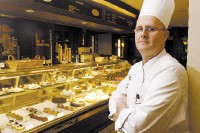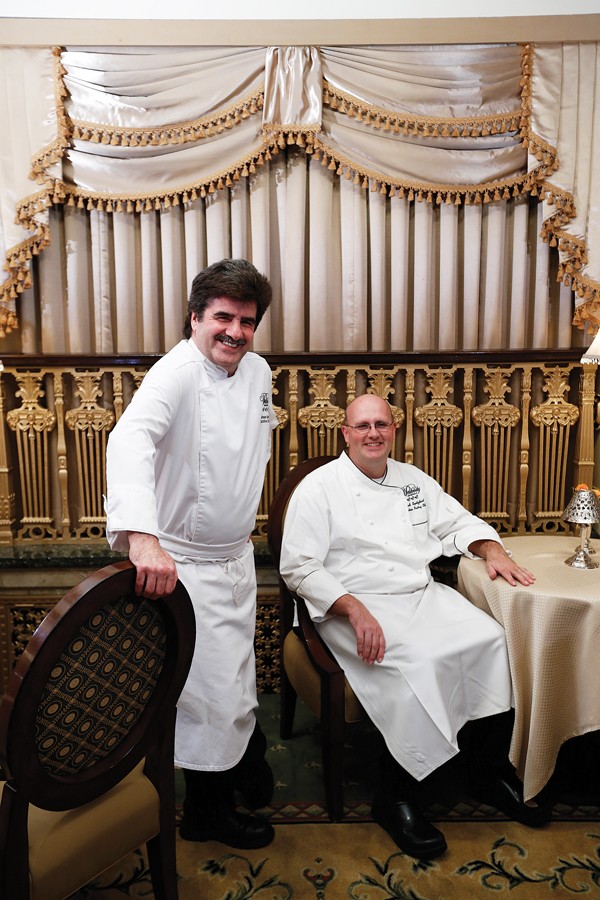On a recent Saturday, I found myself downtown at 5:30 a.m. It wasn’t a long night of bar-hopping that had me out at that hour. Instead, I was in a kitchen at The Peabody hotel to shadow executive pastry chef Konrad Spitzbart who starts his day at the crack of dawn.
The Peabody hired Spitzbart last July. Originally from Austria, Spitzbart most recently worked at the Beverly Hilton in Los Angeles — Hollywood, to be more specific — before coming to replace The Peabody’s Erika Davis, who was the pastry supervisor under former longtime executive pastry chef Alain Gallian.
In Hollywood, Spitzbart commuted 70 miles one way just to get to work every day. He created desserts for many high-profile events — the Oscars, the Grammys — and for many high-profile, highly demanding guests. One day, after he and his wife decided that it was time for a change, he saw the position at The Peabody posted on the Internet.
“It was early one Saturday morning,” Spitzbart recalls. “I remember telling my wife, and she said why not apply. So I sent the application electronically and received a call pretty much right away.”
Then everything went really fast. Within a matter of days, Spitzbart arrived in the Bluff City for an interview, and within a matter of weeks he was back to take over the hotel’s pastry kitchen. Now he has a 20-minute commute from Millington — a piece of cake.
He offers me coffee. I decline. No coffee for me, and no coffee for the chef who looks as fresh as a daisy, even though he didn’t leave the hotel until 9:30 p.m. the night before.
“Rinnie [Chef Reinaldo Alfonso] is out of town, and they were pretty busy at Chez Philippe last night, so I stayed and helped,” Spitzbart explains.
Sixteen-hour days aren’t unusual in the hotel business. When Spitzbart prepared for large events at The Beverly Hilton, he slept at the hotel, if he slept at all.
The Peabody’s pastry kitchen takes up most of the hotel’s third floor. In the main room, mixing bowls are as big as bathtubs and their paddles look like replacement parts for a ship. Some of the ovens fit six-foot-tall speed racks, flash freezers line the back wall, and a walk-in fridge and freezer line the aisle. The fridge is filled with the essentials for a pastry kitchen — rows of milk cartons, cream, eggs, butter, and fruit. There is one room just for chocolate and another for the ice cream maker and for cake decorating. With the oven cranking, the mixer turning, and water running in the sink, the kitchen is like a workshop. It’s probably no coincidence that Spitzbart keeps his utensils in a tool cabinet.
 Justin Fox Burks
Justin Fox Burks
Konrad Spitzbart at The Peabody Deli & Desserts
It’s not even 6 a.m. yet and I’m practically panting trying to keep up with Spitzbart. “Today is a very slow day. We only have to take care of about 200 people,” Spitzbart says. Still, it seems like the only way Spitzbart knows how to work, walk, and think is fast, even if everyone around him is slow and barely awake. And yet, he seems very calm and laid-back.
We start our day with key-lime boats — little boat-shaped tart shells filled with key-lime cream, baked, and then garnished. While we wait for the boats to bake, we’re off to other projects — one project for me, multiple projects for Spitzbart. Occasionally he stops to reposition his eyeglasses, which tend to slide down his nose ever so slightly.
The kitchen’s shift arrives at 6 a.m. Spitzbart is always there before them to catch the night shift, which bakes all the breakfast pastries, bagels, and breads. The next shift arrives around noon and his assistant around 2 p.m.
“The pastry shop never sleeps and never shuts down,” Spitzbart explains. “Everything sweet that comes out of The Peabody comes out of this pastry kitchen, ice cream included. We are responsible for banquets, weddings, the restaurants, room service, afternoon tea, and the deli. The guys from the banquet kitchen could take off if there aren’t any banquets. We can’t.”
I roll miniature cheesecakes in toasted nuts and decorate them with a dot of whipped cream and a raspberry. A little garnish and the pale-yellow mound looks like a pastry lover’s dream come true. Kiwi, blueberries, strawberries, and raspberries are placed on the miniature fruit tarts, a little chocolate is put here, a little glaze there, and with some piping and dipping, several trays of pastries are ready to go.
Spitzbart’s chef in Los Angeles would always say “less sugar, less sweet.” That’s not really the way to go for a pastry chef in the South, but Spitzbart’s goal is to make the pastries sold in the hotel’s deli lighter. “We want to get away from large cakes that are sold by the slice,” Spitzbart says. “We are looking more at European-style pastries — individual servings or smaller, six-inch cakes to take home whole. We work more with fruit, and we want to lighten up our selection while keeping some of the Southern staples like apple, pecan, and key-lime pie.”
We are in the chocolate room now. Small amounts of white, dark, and milk chocolate are kept in tempering machines at all times so that fluid chocolate is on hand for emergency projects. Spitzbart is big on being prepared for “emergencies.”
“Customers and hotel guests expect a certain standard, and we can really never say no,” Spitzbart explains. “There are times when we have to say we can’t do it in five minutes, but we’ll have it ready in an hour.”
The chef makes almost all the chocolate decorations himself.
“You have to develop a feel for it — it’s intuitive, but it’s also very much a science.”
And that’s why Spitzbart, when he came to the United States in 1991, focused solely on pastries. He had apprenticed in restaurants throughout Austria, working in different positions, but found pastry work the most interesting and creative.
“There are so many variables that determine if the cake, custard, or sorbet will turn out right,” he says. “It’s like chemistry. If you forget one little element, it might not turn out. But then again, there’s lots of room to tweak, discover, and be creative because you can combine common ingredients in a totally new way and maybe come up with something extraordinary.”
The Peabody, 149 Union (529-4188)
 Justin Fox Burks
Justin Fox Burks  Justin Fox Burks
Justin Fox Burks  Justin Fox Burks
Justin Fox Burks